
Lithium as a battery metal is becoming increasingly important in the global energy transition for mobile and stationary storage.
The European Union has significant deposits of economic value. However, most of these are still in the exploration phase; only one deposit is being mined, but not for the use of lithium as a battery metal.
This means that the EU is facing major challenges with regard to its ambition to significantly increase its level of self-sufficiency in the coming years.
Together with GeoSphere Austria, the newly founded Federal Institute for Geology, Geophysics, Climatology and Meteorology, the EU research project GREENPEG is holding a symposium and workshop in Vienna on April 22-23, 2024, to explore the state of knowledge we have gained, where the industry and geological services of the EU Member States have been involved so far and which framework conditions for the valorization of deposits in Europe promote and restrict them.
The event is free of charge.
Here you can find the conference program of both events.
"Do you speak English - Honey I do". That was the song in the German hit parade almost 50 years ago. A song that conveyed how you can fall in love with more than just the English language. Nothing has changed to this day, except that the "lingua franca" has become more of a professional language than ever before. And as such, it is also playing an increasingly important role in the natural sciences.
As part of its work with "young careers", GKZ invited a group of first-year geophysics students led by Ms. Darlene Ann Kilian from the Bergakademie Freiberg to the office to discuss the work of the GKZ and its members, with a particular focus on its GREENPEG project. The project is concerned with optimizing exploration technologies and methods for pegmatites as carriers of important metals for the energy transition. The 10 men and women listened with equal interest to Managing Director Reimer's explanations and his "knowledge of languages" from 30 years of professional life on six continents. - However, he found his sweetheart in Dresden - in Saxon!
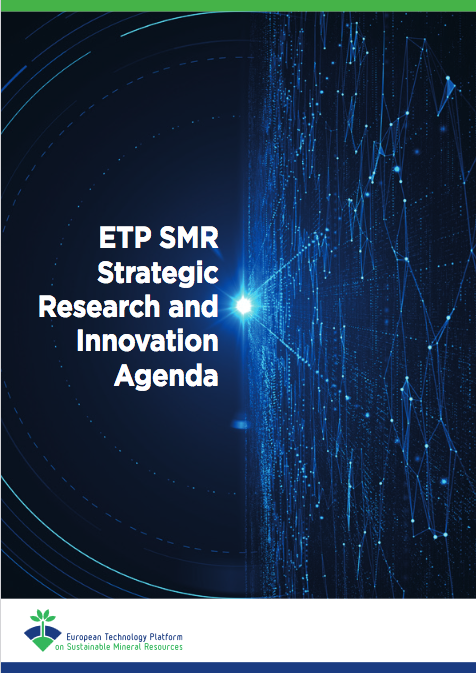
14.11.2023, Brussels: The new Strategic Research and Innovation Agenda (SRIA) of the European Technology Platform on Sustainable Mineral Resources (ETP SMR) published at the EU Raw Materials Week
The richly illustrated document of over 70 pages deals with the geopolitical-socio-economic framework conditions of the EU research objectives for securing raw materials and implementing the twin transitions. It lists the most important future R&D objectives of all compartments of the raw material value chain that will determine the European Commission's future research policy. The European Technology Platforms (ETPs) are initiatives aimed particularly at industry and offer interesting opportunities for international networking. The ETPs focus on strategic issues where Europe's future growth, competitiveness and sustainability depend on major technological advances. They play a key role in defining European research priorities through the development of strategic research agendas and thus serve the needs of industry in a particular way. By participating in an ETP, it is possible to influence the future of European research and its priority topics.
There many reasons to join the Platform! GKZ Freiberg is a member of the ETP SMR and was actively involved in the development of the new SRIA. If you have any questions, please contact Dr. Wolfgang Reimer at wr@gkz-ev.de
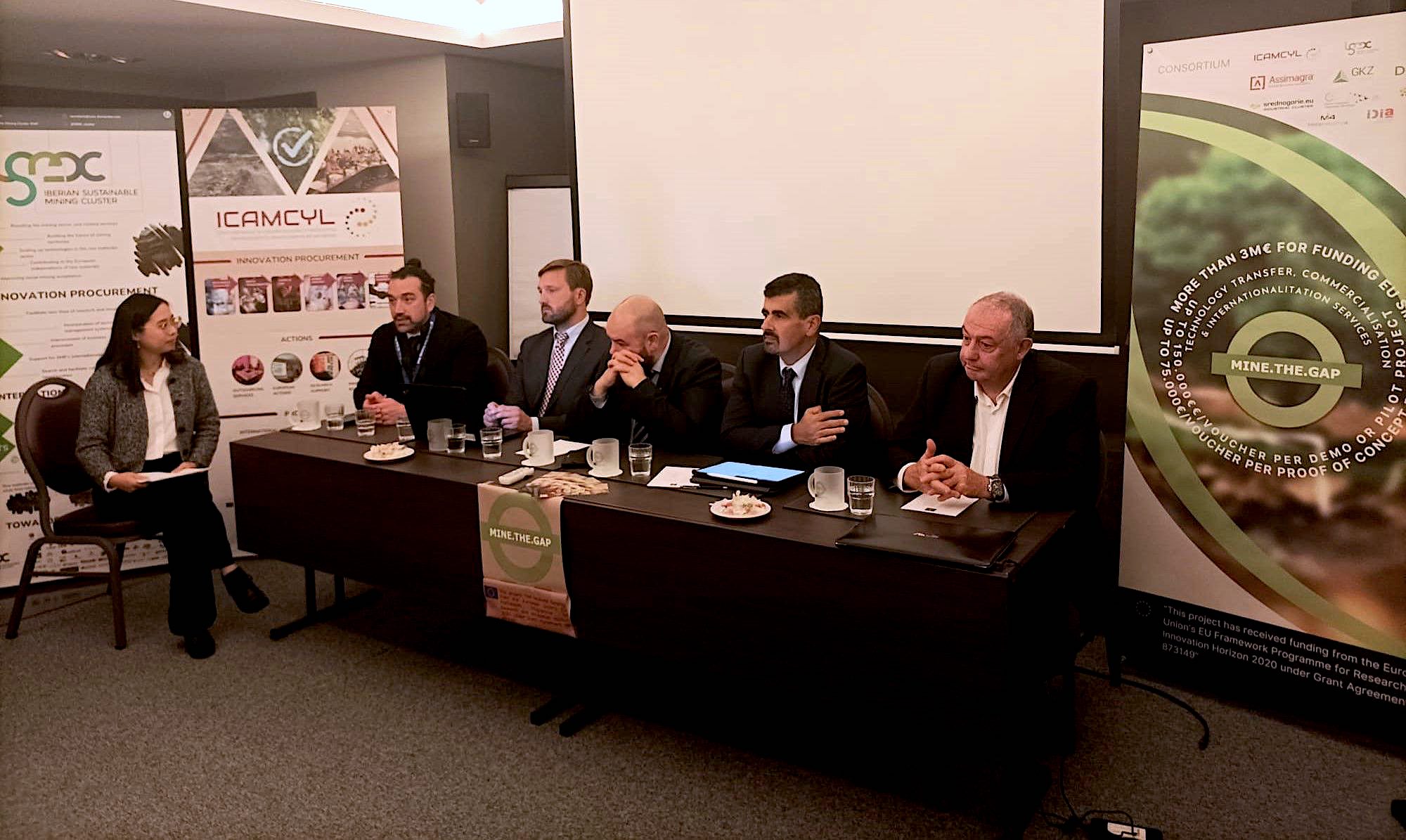
As a satellite event of the EU Raw Materials Week 2023, the final event of the MINE.THE.GAP project showcased best practice in cross - European cluster work. In this new format for the GKZ, the 9 European partners took on the role of project owners and managed two calls with their own budget addressed to innovative SMEs along the value chain of mineral raw materials. The granted projects beneficiaries (among them members of GKZ) were not only provided direct financial support, but also business support services and an online collaboration platform. In total, MINE.THE.GAP funded 26 projects implemented by 63 SMEs with a 100% funding rate for a max. grant up to €50,000 per SME with another max. €10,000 for other business services. The project-based cross-sectorial and interregional collaboration of clusters does not only achieve synergies but also jointly improve SMEs’ competitiveness.
The closure conference was extended by a special panel discussion about Impact Results of MINE.THE.GAP project and Future Scale Up to a Raw Materials EUROCLUSTER moderated by Mrs. Meng-Chun Lee, the project manager from GKZ. The speakers included Benoit Esmanne (Policy Assistant of DG for Internal Market, Industry, Entrepreneurship and SMEs at the EC), Jose Ramón Natal (Cluster Manager of MI4), Luís Martins (President of the board of ACPMR), Mika Riipi (County Governor at the Regional Council of Lapland) and Santiago Cuesta-López (General Manager of ICAMCYL and ISMC). The discussion highlighted clusters as an important multiplicator to implement the ambitious policies focussing to foster the raw materials sector different value chains and support the EU strategic autonomy. As a result of the project and from the experience of numerous cluster networking activities in the contributing partner countries, it became clear that clusters play an outstanding role in the effective implementation of the European Commission's raw materials agenda right down to the regional level. And vice versa, the region provides a great deal of impetus for their verification and feasibility. In this context, the participants welcomed the promotion of EUROCLUSTERS Raw Materials and also found support for this from the representatives of the Commission.
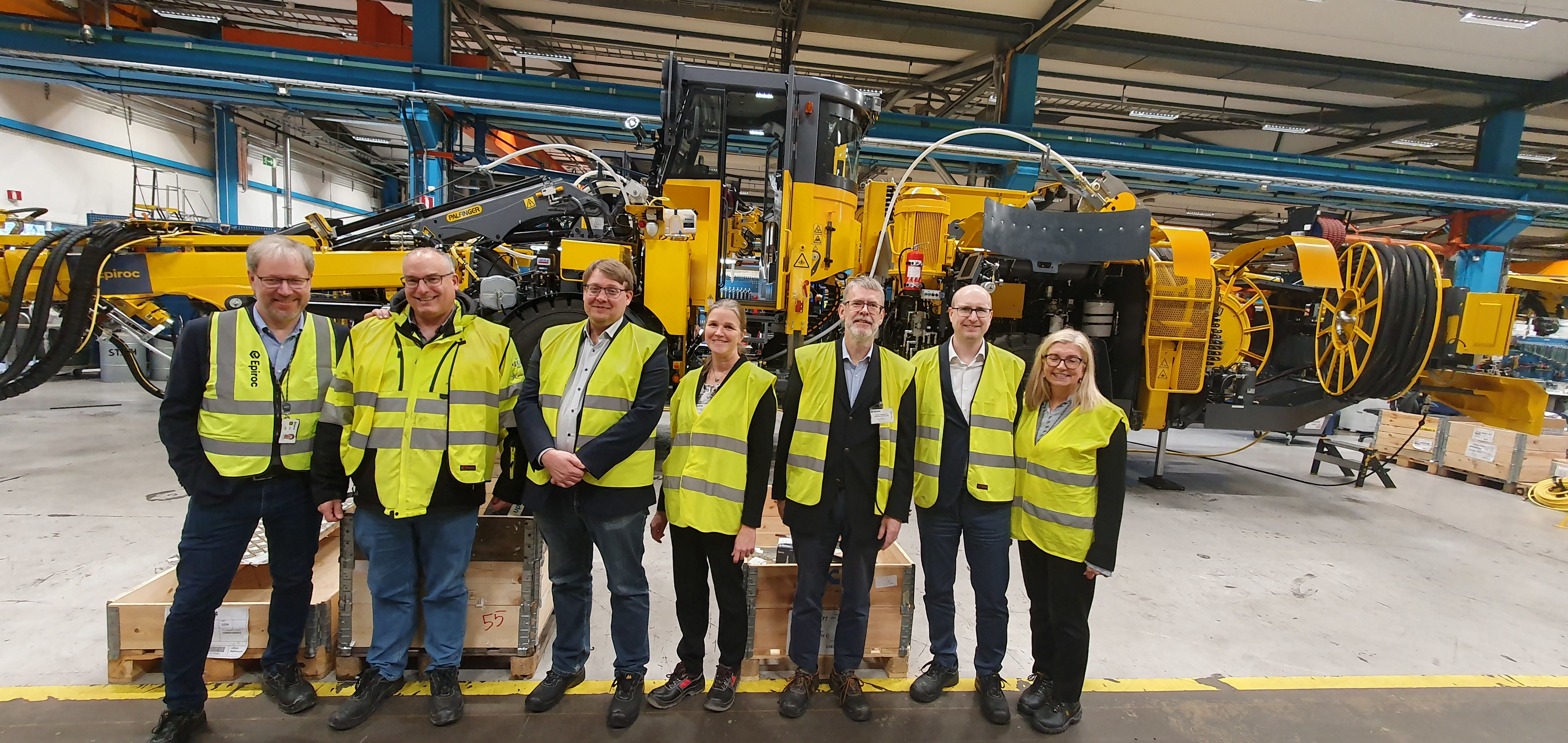
1.11.2023, Brussels: Managing Director of GKZ Dr. Wolfgang Reimer confirmed as Vice President of the European Technology Platform on Sustainable Mineral Resources (ETP SMR)
Wolfgang Reimer, Managing Director of GKZ Freiberg and Vice President of the ETP SMR, was confirmed in office for a further two years at the ETP General Assembly on November 1, 2023 in Örebro, Sweden. His colleague Katarina Nilsson, Director of Research and Innovation at the Swedish Mining Association SVEMIN, was also re-elected as President. Katarina Öquist, Epiroc Rock Drills AB and Michael Tost, Montan University Leoben were newly elected to office. The European Technology Platforms (ETPs) are initiatives aimed particularly at industry and offer interesting opportunities for international networking. The ETPs focus on strategic issues where Europe's future growth, competitiveness and sustainability depend on major technological advances. They play a key role in defining European research priorities through the development of strategic research agendas and thus serve the needs of industry in a particular way. By participating in an ETP, it is possible to influence the future of European research and its priority topics.
There are many reasons to join the Platform! GKZ Freiberg is a member of the ETP SMR and was actively involved in the development of the new SRIA. If you have any questions, please contact Dr. Wolfgang Reimer at wr@gkz-ev.de
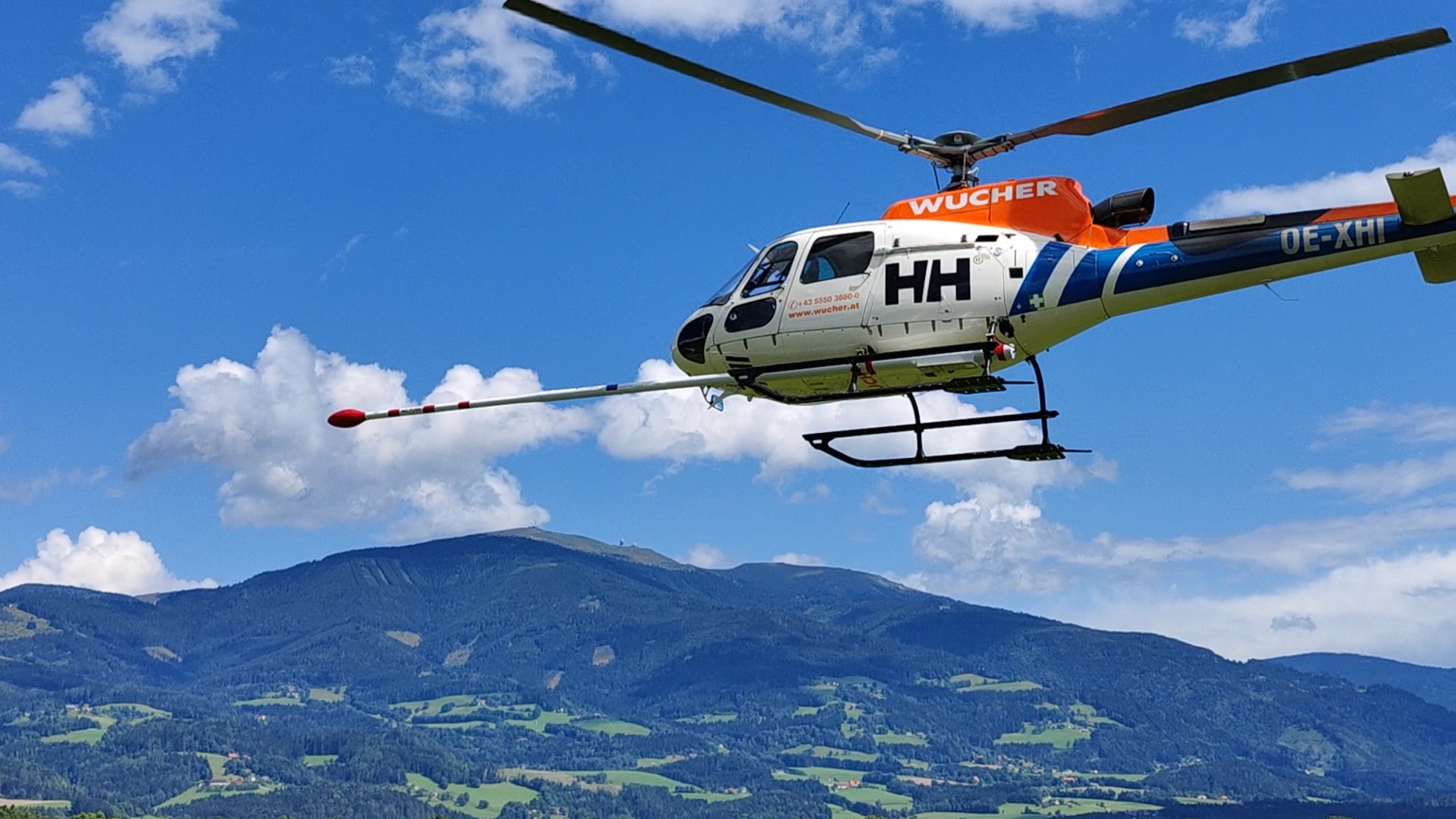
Watch our movie about the first EASA certified helicopter borne nose stinger and a release of the GREENPEG toolset for exploration of NYF LCT pegmatites, main resource of hard rock lithium. Learn more about GREENPEG at https://www.greenpeg.eu/ or on LinkedIn and become a GREENPEG "follower" in the year of the dissemination of many results at numerous events in Europe and overseas and via online partnership with the project by subscribing under contact@greenpeg.eu . GKZ Freiberg is a partner in the GREENPEG consortium and responsible for the exploitation of the results. If you have any questions, please contact Dr. Wolfgang Reimer, Exploitation Manager GREENPEG at wr@gkz-ev.de
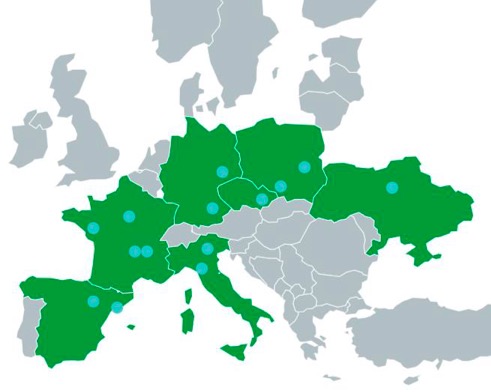
IDEALIST aims to facilitate the sustainable economic recovery of three European industrial ecosystems (ecosystems 1/ Energy-intensive industries, 2/ Aerospace and Defence, 3/ Mobility, Transport & Automotive). The objectives specifically include establishing relationships with alternate suppliers for critical advanced technologies, materials/components, and supply schemes. The coordination and support measures are structured into interconnected building blocks, which aim to provide foresight tools, drive technological adoption, strengthen supply chain resilience, and establish strategic alliances utilizing AGORA as a pan-European collaboration platform.
IDEALIST is to support SMEs in the given industrial ecosystems in their ability to understand and adapt to changes brought about by rapid and unexpected developments in the world such as the COVID-19 crisis or the war in Ukraine. These 3 sectors are of capital importance for the European economy and despite their specificity, have common challenges that the project will help to address: transition to more sustainable practices, competitiveness issues in a context of scarcer raw materials and more expensive energy, change in consumption habits… Being more resilient means giving SMEs the opportunity to be a player in these changes and no longer just a spectator or follower. To do this, the project will evolve around three pillars 1/ Strategic Foresight to establish relevant tools and behaviors to anticipate and better prepare for change in an orderly and systematic way, 2/ Technology Uptake to overcome obstacles related to the implementation work of Advanced Technologies and lay the foundations of alliances between tech-savvy and traditional SMEs and 3/ Supply chains to identify critical dependencies and weaknesses in order to limit the impacts of disruptions on value chains. This work will lead to the realization of Pilot Projects promoting the meeting between ecosystems, facilitated by the use of the Hack&Match method. The mobilization of the AGORA platform led by EIT Manufacturing will support this objective of matchmaking and community building. The project is carried by a relevant consortium of 14 partners from 6 European countries and Ukraine representing several thousand manufacturing companies. The project will take place over 36 months.
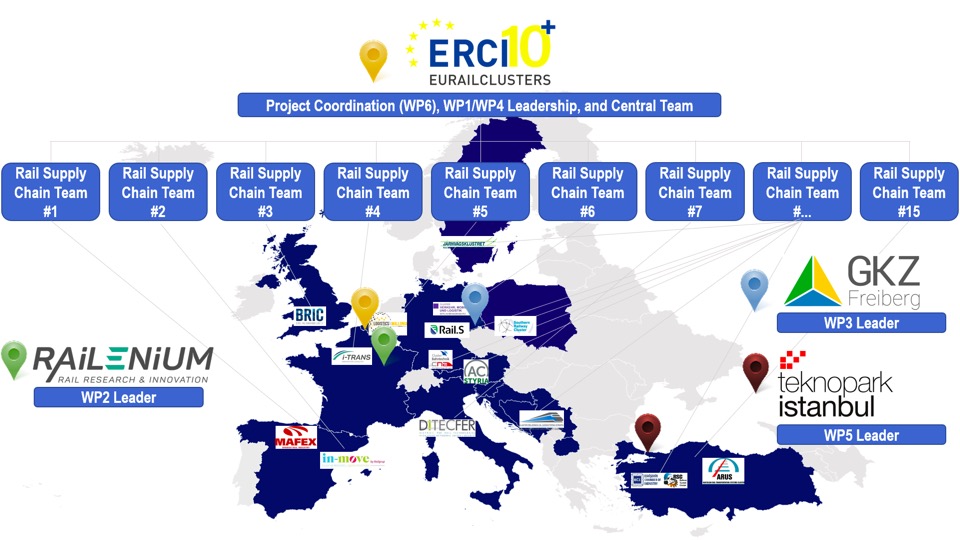
The ultimate goal of the project is to assess and increase the European Rail Supply Industry capacity to deliver the European vision of a radically transformed railway system in 2030, and thanks to this, to remain global leader.
To achieve this, LEADER 2030 has developed a very holistic approach and methodology thanks to a very strong and complementary partnership joining all the necessary competences from the Rail, Raw Materials and Innovation sectors, and strategically open to synergies with other relevant organisations in Europe that already support the project with their LoS (10).
The objectives of LEADER 2030 are: (1) Understanding (a) what has already proven to be vulnerable in the EU industrial ecosystems in general (given cross-sectorial problems), and in the EU Rail supply chain (OEMs and 1-3 Tiers) and Raw materials supply chain in detail; (b) what the ERJU-driven innovations for 2030 will look like in terms of components and raw materials (detail from OEMs to 1-3 Tiers level); (c) what the European supply capacity of such components and raw materials will look like; (d) what elements will impact on such supply capacity (enablers, obstacles); (e) how enablers can be further boosted and how obstacles can be fixed/mitigated to foster autonomy and resilience; (f) what will go out from the Rail supply chain in terms of demand in 2030, and (i) if this can be used to free-up components and raw materials useful to the new innovations (ii) how to support the reconversion (total/partial) of affected companies; (g) how to get the Rail supply industry – with specific attention to SMEs and start-ups – ready for 2030 demand; (2) Proposing/Recommending policy-level actions and industrial-level actions as result of all the intelligence analysis made in the project.
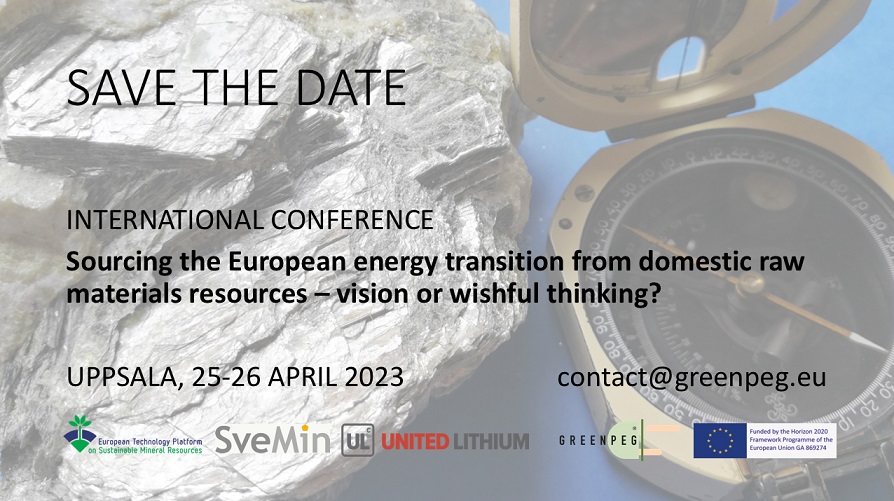
Sourcing the European energy transition from domestic resources – vision or wishful thinking? This one-day conference questions Europe's raw materials supply security in the context of its economically viable raw material potential and of current geopolitics. It examines the existing and future framework conditions for mining projects and their downstream value chain (regulation, financing, permitting). The question arises, which course do we follow?
The conference also focuses on the work of the European Geological Surveys for the territorial mapping of critical raw materials and highlights the potential for cooperation with Africa. On April 26th, a site visit is offered by United Lithium Corp. to Bergby Lake Lithium exploration project.
Sweden currently holds the EU Council Presidency for the first half of 2023. Sweden is one of the most important mining countries in Europe with great raw material potential for managing the energy and mobility transition and securing the raw material supply for future technologies.
The conference is hosted by the EU HORIZON 2020 project GREENPEG, in cooperation with the Swedish Mining Association SVEMIN and the European Technology Platform on Sustainable Mineral Resources (ETP SMR) and will take place in picturesque city of Uppsala, 20 minutes by train from Stockholm Airport. Participation is free of charge.
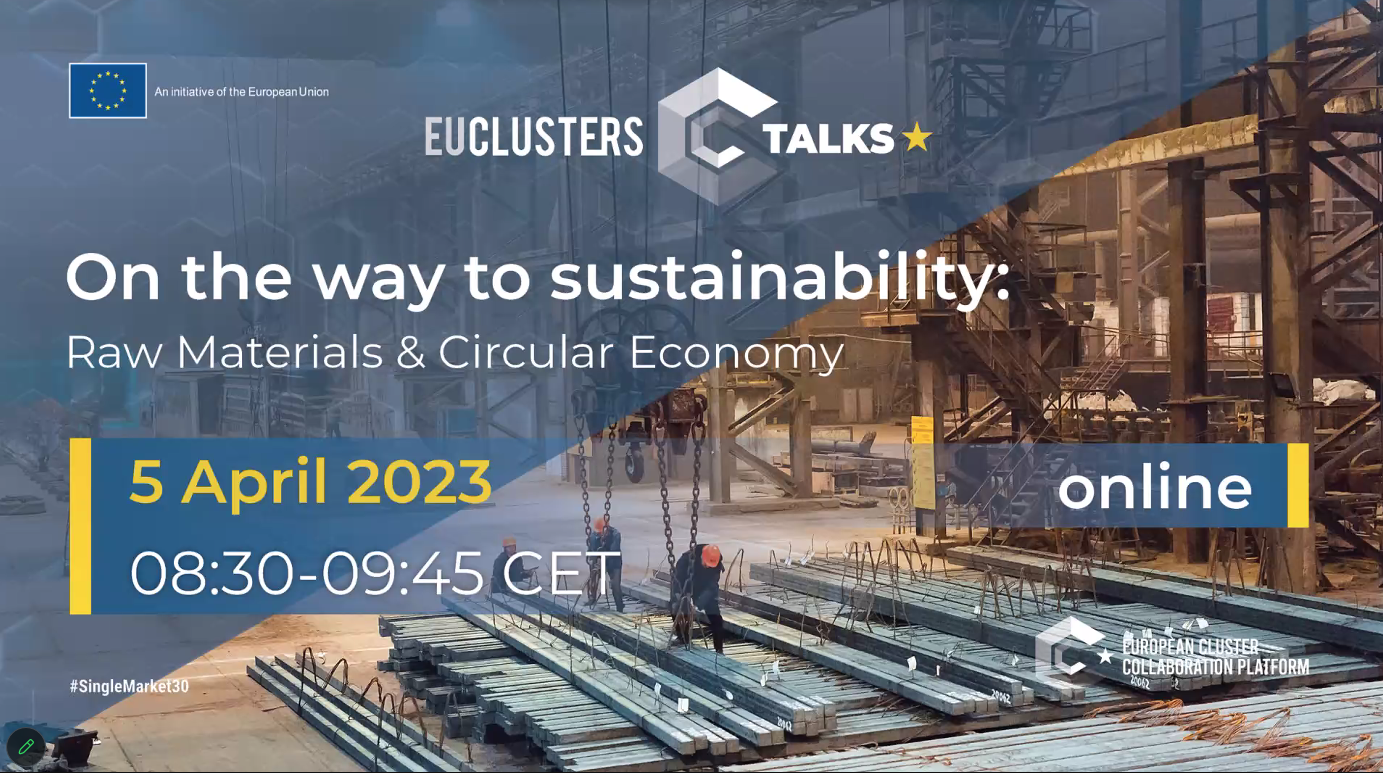
5.4.2023, Brussels: EU Clusters Talks: On the way to sustainability: Raw Materials & Circular Economy
On the way to sustainability the EU Clusters Talks, an online format provided by the European Cluster Collaboration Platform, focused in its 5 April 2023 edition on raw materials & circular economy. Representatives of DG GROW introduced into the recently published proposal of a European CRM Act of the European Commission to the European Parliament, which was heavily debated by the panelists, including representatives from EU Platforms, EITs, and business associations, including GKZ Freiberg represented by managing director Dr Wolfgang Reimer. The major outcomes are concerns how contradictions between policy objectives and regulations can be avoided and how the framework conditions to implement the CRM Act can be improved. High energy prices, a volatile energy supply risk, shortages in skilled labor force, an increasing EC and Member States bureaucracy as well as hesitant willingness to restrict excessive participation processes and environmental regulations are increasingly impacting the economic feasibility to strengthening the raw materials sector including recycling. Dr Reimer pointed out that these issues are inadequately considered by the CRM Act proposal. More than this the 2030 benchmarks set in the CRM Act proposal were regarded by all panelists as too ambitious. Recent EC legislation such as the Corporate Sustainability Reporting Directive and Supply-Chain-Act are not at all very helpful to foster reindustralisation in terms of smart specialization which is very much needed to implement the European GREEN DEAL.